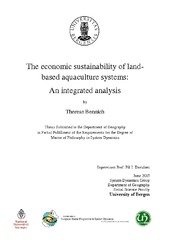| dc.description.abstract | The global demand for fish is rising, caused by population growth and an increasing per capita consumption of fish. At the same time, production from capture fisheries has stagnated and there are growing concerns about the environmental impact of sea-based aquaculture. Future developments in the fishing industry must meet demand, without compromising the environment. Technological advancements have introduced land-based fish farming and Recirculating Aquaculture Systems (RAS) technology as a potential way forward. This type of production could potentially give an opportunity to produce large quantities of biomass in a controlled environment. There is, however, large uncertainty regarding the economic sustainability of this type of production. This research aimed to evaluate under what conditions land-based aquaculture can be economically sustainable. The boundaries were set to a hypothetical land-based aquaculture facility in Norway, and a system dynamics approach was used. Land-based aquaculture systems are complex and consist of a large number of integrated components and processes. System dynamics is a useful method in this context, because it allows for an integrated and systemic analysis of the functioning of these systems. The results of the study indicate that land-based aquaculture production can be economically sustainable, given optimal system performance, full capacity utilization and stable market conditions. The results also support the underlying assumption that land-based aquaculture production is relatively resource efficient and environmentally friendly. One limitation of this study is the uncertainty related to the aggregated effect of water quality on biomass growth and mortality rates, which is an important area for further research. One additional suggestion for further research is to extend the environmental analysis, in order to fully assess the potential environmental impact of land-based aquaculture production and how this links to economic sustainability. | en_US |
